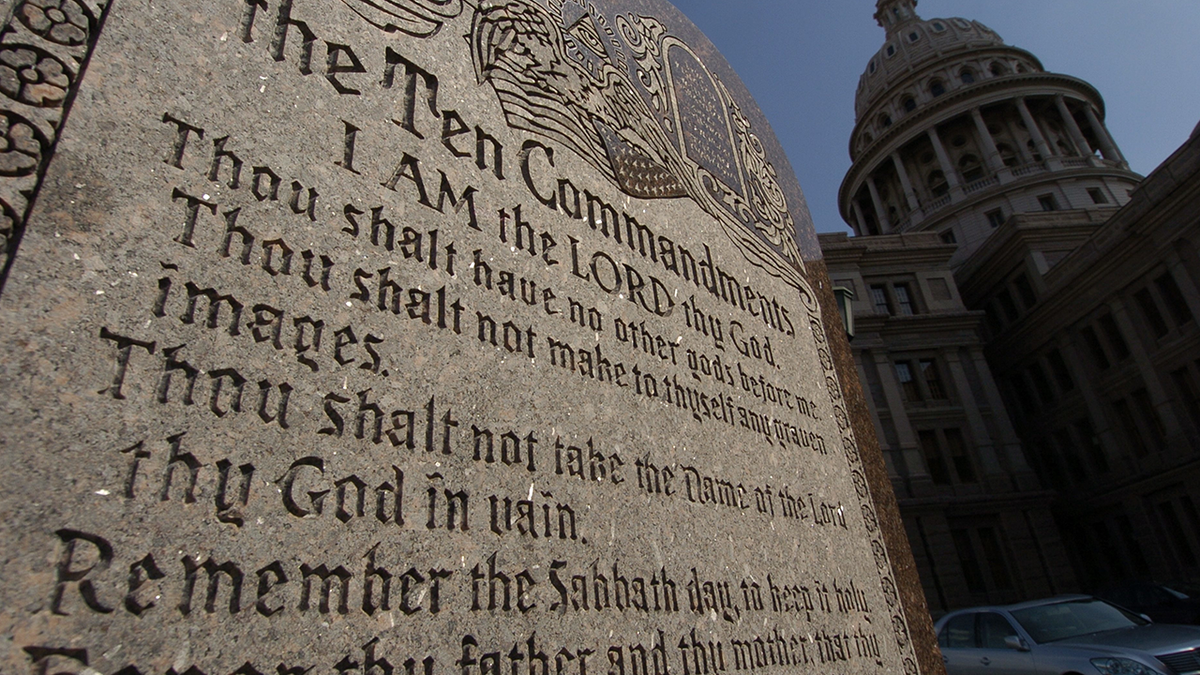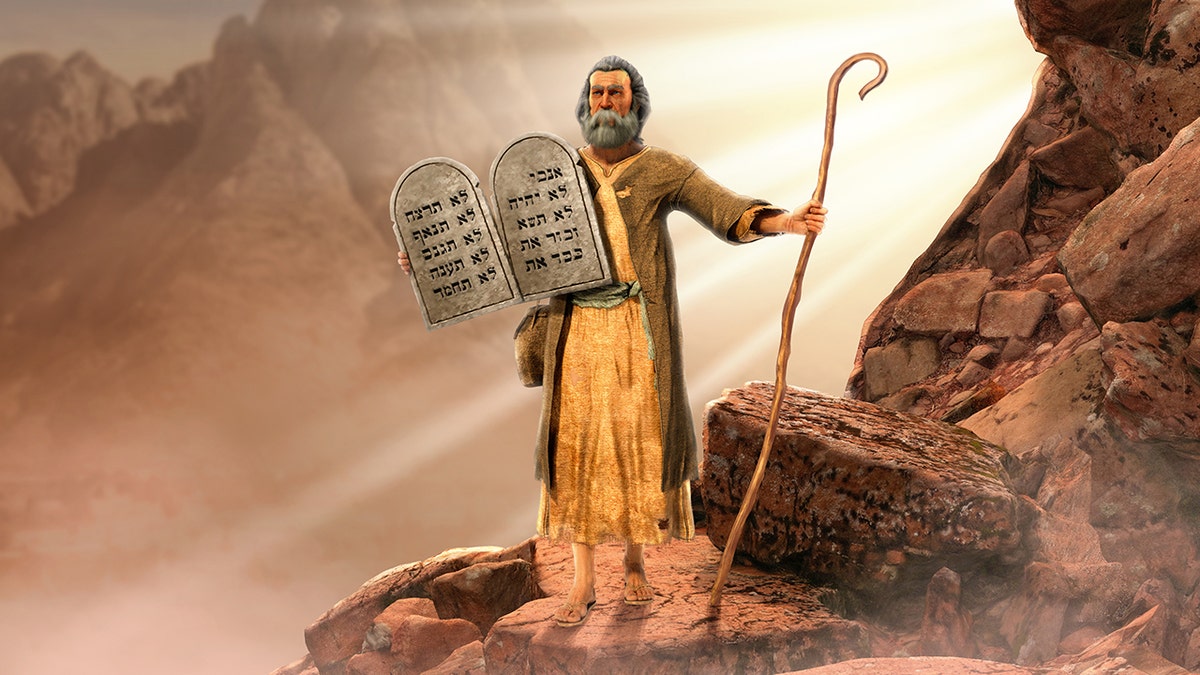Fox News Flash top headlines for August 29
Fox News Flash top headlines are here. Check out what's clicking on Foxnews.com.
Earlier this summer, Republican Louisiana Governor Jeff Landry signed into law a requirement that all public classrooms display the Ten Commandments. Broadly similar laws are moving through legislatures and courts in a variety of other states – as they have at various points over the past 75 years. Especially as the school year begins, it is worth considering: Should the Ten Commandments be placed in every classroom?
A potential problem that some have raised concerns the "separation of church and state." First, that expression (or idea) is not used anywhere in the Constitution – which guarantees the right of everyone to practice the faith of their choosing, and forbids the state establishment of a particular faith.
It would be hard to seriously argue that the posting of the Ten Commandments is an expression of the state establishing Judaism (from whose sacred text, the Torah, they derive) as its official religion. Second, numerous Supreme Court decisions are very clear that a religiously derived symbol or teaching is permissible in a state function if it also serves a secular purpose.
The problem with just posting the Ten Commandments is that they are not self explanatory like a banner, flag, cross or Star of David might be. A school which only posts the Ten Commandments risks one of two outcomes.

The Ten Commandments offer moral guidance that stands the test of time. FILE: A six-foot high tablet of the Ten Commandments, which is located on the grounds of the Texas Capitol Building in Austin, Texas, is seen on February 28, 2005. (Getty Images )
First, they might be reduced to a mere symbol of a victory in a culture war. Second, they might be tokenized or trivialized – considered alongside other classroom posters such as: "Every Learner is a Masterpiece in Progress," "We Value Diversity, Tolerance, Love, Respect, Equality," and "Every Student, All Day, Every Day #Attendance."
This would be unfortunate, and even tragic, as the Ten Commandments – in around 250 words – contain life-transforming potential. When learned, the Ten Commandments are revealed to be the most concise, interesting, wise, instructive and universal moral guidance and ethical teaching ever issued, accessible to and relevant for people of all faiths and in all eras.
Therefore, the Ten Commandments should not just be posted in schools. They should be taught in every public school system. Fortunately, the Ten Commandments very much do exist – and are tailored-made for educating, deepening, growing and uplifting every student who is taught them.
A teacher’s guide for teaching the Ten Commandments could easily be constructed by educators and scholars, regardless of their faith. Indeed, a guide constructed by people with different perspectives and from different traditions would make it even richer and more fulfilling.
I am quite sure this would happen because I, as a devout Jew, teach Torah every week to evangelicals (through the parachurch ministry Eagles Wings in their Torah Tuesday program). I often learn new, true and even brilliant insights into the text from my Christian brethren who approach our shared love of the Torah from a different tradition and perspective.
A well-constructed teacher’s guide would yield life lessons and existential questions, unavailable elsewhere, that would invigorate all seekers and make seekers out of all of our children. Here are just a few examples:
- In the First Commandment, God introduces himself. As we do on business cards, God picks just one description of himself out of many possible ones to use. It is: "I am the Lord your God who took you out of Egypt, from the house of slavery." God’s most important self-proclaimed quality, we see, is that of liberating people from suffering. We learned earlier in the Bible that we are "created in God’s image" – and, therefore, should regard liberating others from suffering to be our most important responsibility. Who, from among those we know and don’t know, can we help to liberate from suffering? How might we do so?
- The Second Commandment prohibits idolatry. This commandment warns against, most broadly, giving too much allegiance or devotion to things that do not deserve it. Is there anything in our lives that we give too much allegiance to or care too much about? If so, how can we diminish (or eliminate) these commitments – and direct our energies to things that are more deserving?

Moses holding 10 Commandments tablets coming down from Mount Sinai. (iStock)
- The Third Commandment prohibits taking the name of the Lord in vain. This is, as the Israeli-American scholar David Hazony writes, a prohibition on "making false oaths" – and a commandment to "act truthfully and represent ourselves honestly." How have I experienced people (including, possibly, myself) acting with less than full integrity? Why might this commitment to integrity be important enough for an individual and a society to constitute the Third Commandment?
- The Fourth Commandment separates the Sabbath from the rest of the week, and distinguishes it as a day of rest. This means, in the Torah’s understanding, that work ceases and electronics are shut off. The Sabbath is, as the Ten Commandments continues, a day to be "sanctified." One does not sanctify a day by lounging on the couch. How might one sanctify a day each week? Is there a value, independent of any religious claim, to having one day every week to devote to family, friends, books, contemplation and other activities designed not for creation but re-creation? If so, how might such a day be lived?
- The Fifth Commandment instructs us to honor our mother and our father. The commandment to "honor" necessitates consistent action well beyond feelings and niceties. The foundational example in the Jewish tradition of this is found in the Talmud: Dama Ben Netina, a gentile, chose to forgo a large sum of money rather than to disturb his father’s sleep. How can each of us honor – and, in so doing, thank – our parents accordingly?
- The Sixth Commandment prohibits murder. What distinguishes a murder from a justified killing? The Jewish tradition builds on this commandment, and says publicly embarrassing someone is a kind of murder – as evidenced by the fact that blood can be drained from the face in both instances. How might I – even unintentionally – have publicly embarrassed someone (or stood by while others are being publicly embarrassed?). What are other instances, besides public embarrassment, where an all too regular act strips the (metaphorical) life out of someone?
- The Seventh Commandment prohibits adultery – and, therefore, recognizes and honors the concept of sacred relationships. What is the role of sacred relationships in my life, now and in the future? What do I owe people with whom I am in such a relationship? Why would the Seventh Commandment present marriage as the ultimate sacred relationship?
- The Eighth Commandment prohibits stealing. Yes, this prohibits robbing the corner store. But stealing need not be interpreted so literally. Am I stealing someone’s time when I go into the same store and spend time with a salesperson discussing a product that I intend to buy on Amazon when I leave? (In the Jewish tradition, this is an easy yes).
CLICK HERE FOR MORE FOX NEWS OPINION
- The Ninth Commandment prohibits bearing "false witness against your neighbor." There are at least two consequences to bearing false witness. One is the breakdown of the justice system. But this commandment is not limited to a judicial context. If one bears "false witness" anywhere, he will diminish or destroy the reputation of the person he is speaking about. Why is one’s reputation so important? What can I do to assure that I can be proud of my reputation – and assure that I do not unjustly assail that of others?
- The Tenth Commandment does not primarily concern an action (like adultery, stealing or murder) but a character trait – coveting. Specifically, the Commandment prohibits coveting a neighbor’s ox, donkey, horse, land or "everything" that belongs to him. The use of "everything" rather than "anything" implies that coveting is obsessive – that one who covets will soon become consumed by these desires. Is this true? Moreover: What do we think of the fact that the ultimate commandment concerns a character trait rather than a specific behavior? Why might (or might not) character – reflected in, but distinguished from actions – be so important?
A well-constructed teacher’s guide would yield life lessons and existential questions, unavailable elsewhere, that would invigorate all seekers and make seekers out of all of our children.
It is completely remarkable that such a short text – one that is less than one-fourth the size of this (very incomplete!) commentary – can be so comprehensive, practical and wise. In just 250 words, the Ten Commandments offers its students deep access into the three universal and always relevant domains of life: personal character, social relationships and societal systems.
CLICK HERE TO GET THE FOX NEWS APP
And the Ten Commandments are not even done there. A study of the Ten Commandments also becomes an education into education itself – specifically how to probe, question and learn. The only thing they don’t do is explain or teach themselves. That’s fine; neither do math, science, history, literature or languages.
Thankfully, we have teachers and schools. By all means – post the Ten Commandments, but only after teaching them … when, almost surely, students and teachers of all faiths will deeply appreciate the great questions they inspire, revere the deep truths they reveal and want the constant reminder that a classroom posting will provide.












































